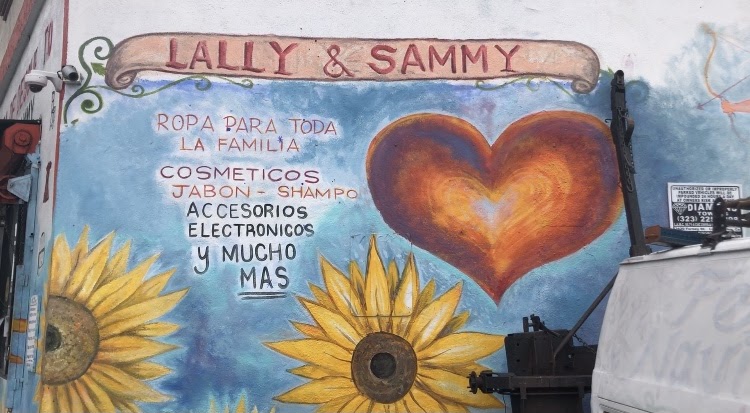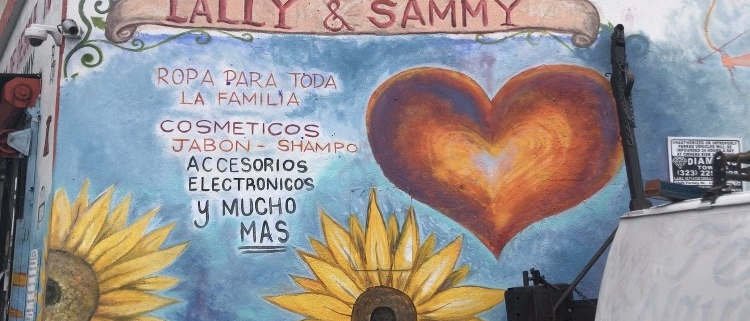Local business struggles due to losses from pandemic

Setting up Lally and Sammy’s for the day at 9 a.m., cleaning the variety store’s shelves and rearranging clothing, Beatriz Hernandez has thoughts occupied by a looming threat.
The looming threat is a call from her landlord, whose calls have become increasingly demanding since the start of the coronavirus pandemic, leaving Hernandez and her daughter Samantha Mendez, who also works at the store when she is not attending school, stressed and often depressed. With overdue rent piling up and business worse than before the pandemic began, Hernandez faces the risk of eviction from her once successful business, losing not only her source of income, but the store she loves.
“At the start of the pandemic, the [landlord] was a bit conscious, and he said there wasn’t any problem. But I tried to pay at least half of the rent or whatever I could,” said Hernandez in Spanish. “But now, the [landlord] is hovering over me and wants me to pay more — he wants me to pay or leave.”
Six years ago, Hernandez saved enough money to achieve her dream of opening her own clothing and convenience store — a place where she can sell what she wants, decide her own prices and make more money.
Ten years beforehand, to save money, Hernandez worked long hours, early mornings and late nights, spending nights in her car with her two daughters because they didn’t have enough time to go home.
“We would wake up at three in the morning so we could have enough time to set up and everything,” Mendez said. “In the morning, we wouldn’t have time to go anywhere, to go eat breakfast or have enough sleep. We would also sleep in the truck because we wouldn’t get enough sleep.”
Located a little over a mile from USC and downtown in South Los Angeles, the outside of her store is covered with a mural depicting yellow sunflowers and a warm red heart painted on top of a light blue background. “Lally and Sammy,” the top of the mural reads in red and pink lettering, is named after Hernandez’s two daughters, Lally and Samantha Mendez.
Before the pandemic, Hernandez’s business was successful — she made more money with better hours than she did at her old job at a cafe.
But now, her business hangs on by a thread. Hernandez had to shut down the store for four months, and she continues to struggle to get as many customers as she did before lockdowns began last March.
The prospect of losing her store as well as the loss of customers weighs on Hernandez, Samantha said.
“She feels stressed because of all the calls she gets from the [landlord],” Samantha said. “She says she sometimes falls into depression… Some days she doesn’t even make 10 or 20 dollars.”
The pandemic has been a turbulent time for many business owners, with more than 200,000 additional small business closures coming as a result of lockdowns and changing customer habits, according to a report from the Wall Street Journal. According to the Small Business Administration, the United States issued $799 billion at time of publication in forgivable loans through the Paycheck Protection Program, a major lifeline to businesses. However, reports have shown that these loans have not been distributed equally, with Black, Latinx and Asian borrowers facing significantly more barriers to receiving loans than white borrowers.
According to the Los Angeles Times and Reveal Center for Investigative Reporting, businesses in majority white neighborhoods received PPP loans at a two times higher rate than in Latinx neighborhoods, a 1.5 times higher rate than in Black neighborhoods, and a 1.2 higher rate than in Asian neighborhoods.
Director of Fair Lending at National Community Reinvestment Coalition Anneliese Lederer said that there were certain barriers that caused the PPP loan disparity, including a lack of existing relationships with banks, banks discouraging Black and Latinx people from applying for loans, inequality in outreach and an initial rule that did not allow people with criminal records or who had defaulted on student loans to benefit from the PPP program.
A report from the NCRC sent comparable applications from Black, white and Latinx small business owners to banks and found that white owners were granted loans at higher rates than Black and Latinx owners, even when all other factors were equal, Lederer said.
“The PPP loan specifically is a program that is supposed to save businesses. If you can’t access this money, you can’t save your business,” Lederer said.
Michael Chasalow, a professor at the USC Gould School of Law and director of the USC Small Business Clinic — an organization that began providing pro bono legal services to small businesses during the pandemic — said complicated rules and unclear messaging contributed to the challenges faced by small businesses.
“[The PPP program] was advertised as helping small businesses but you needed a legal team to navigate just the application process,” Chasalow said. “The businesses that were in a position to have either a lawyer or maybe even a banker that would help them navigate the system, got money right away.”
Conflicting messaging, such as those that suggested some small businesses could not access funds or that the government would ask for their money back, may have played a role in some small businesses owners’ hesitation in accessing loans, Chasalow said.
“Because they didn’t have a navigator, they just opted out completely, like ‘When in doubt, don’t mess with the system,’” he said.
Although rules eventually changed to favor small businesses, “by then, you had a lot of businesses that just felt like it was too late and too uncertain to mess with,”Chasalow said.
Surrounded by colorful clothes draping the walls and walkways of Lally and Sammy’s, Hernandez’s daughter Samantha said the store is important to her and her family, remembering the hard work it took to open it. Samantha has helped her mom work nearly her entire life, accompanying her mom to work since she was two years old.
Thinking about the late nights Samantha has spent working with her to open the store and pay the bills, Hernandez said that Samantha “helps me too much.”
All the hard work and the store matters to Samantha. She, too, often worries about it closing, she said.
“It actually means a lot. From here, we eat, pay bills and buy stuff that we want,” Samantha said. “The store is really personal to me.”
With the stress of navigating the pandemic, Hernandez said she sometimes feels like giving up.
“Essentially, it’s affected everything … all of this affects me emotionally. I get anxious of paying the rent,” Herndandez said. “Los días están feos. La gente no viene.”
Other times, Samantha said, Hernandez motivates herself to work harder, desperate to get customers to start shopping at the store like they did before the pandemic.
“She comes and leaves super late. She stays cleaning and organizing or moving stuff for the store to look better,” Samantha said.
Still early in the morning, Hernandez walks behind the counter, prepared for the day ahead of her, clothing lining the walls and steady, upbeat music thumping throughout the store. Now 9:45 a.m., Hernandez has cleaned and rearranged the store, hoping to once again see the normal flow of customers walk through the door.

